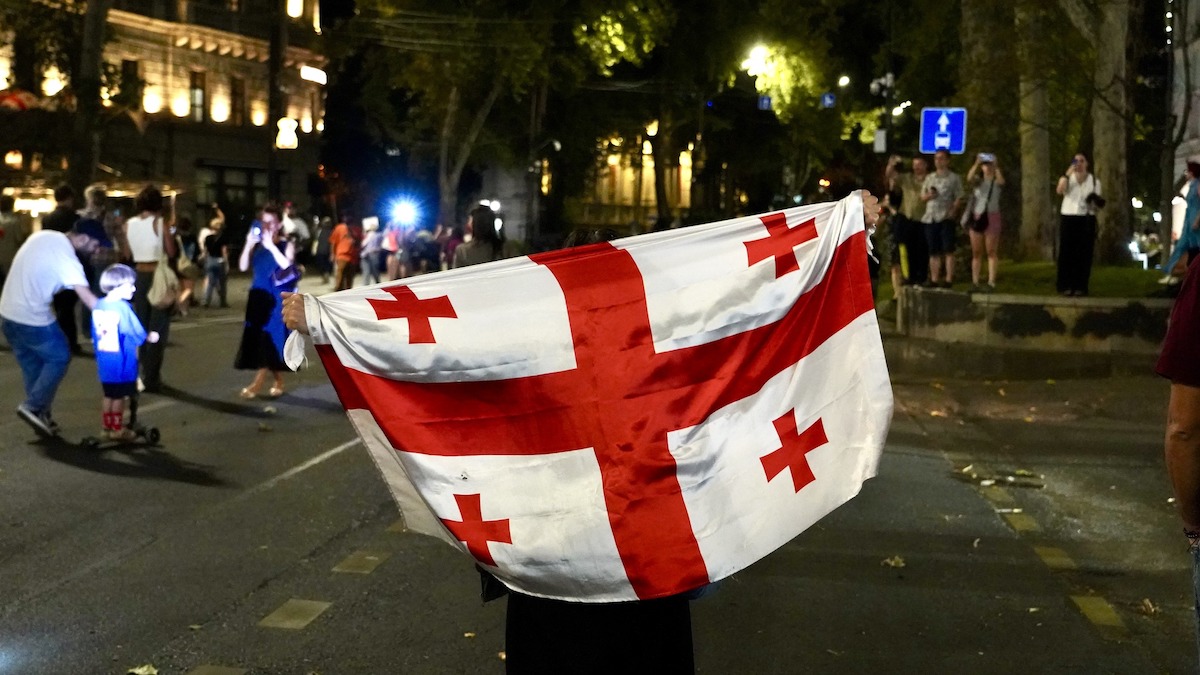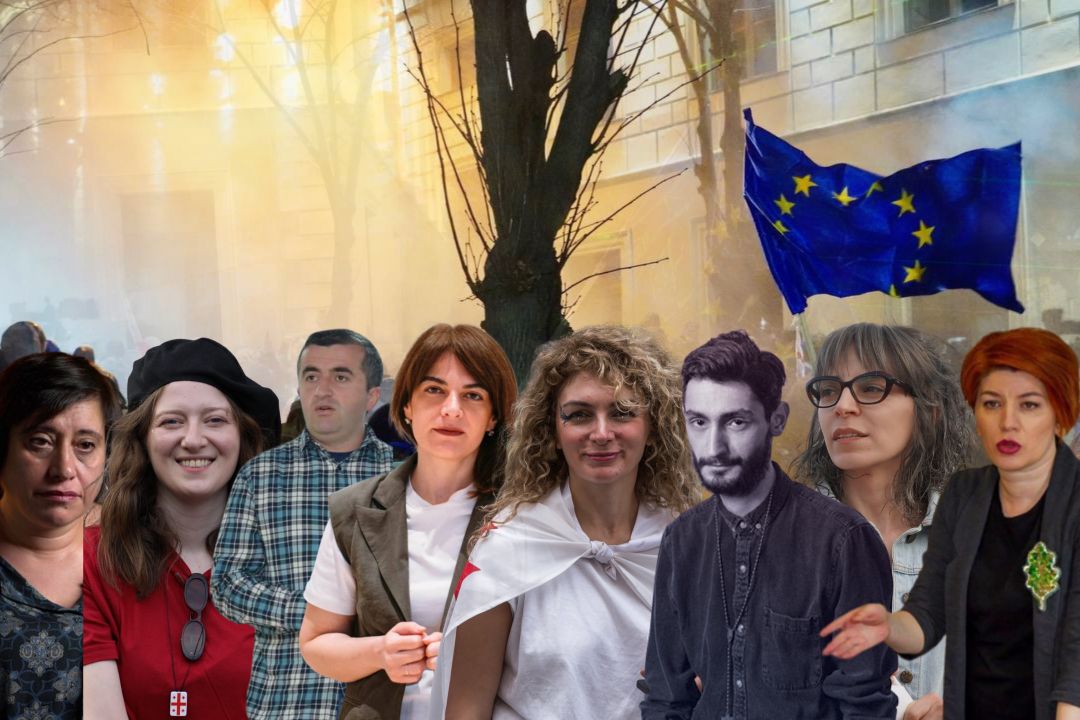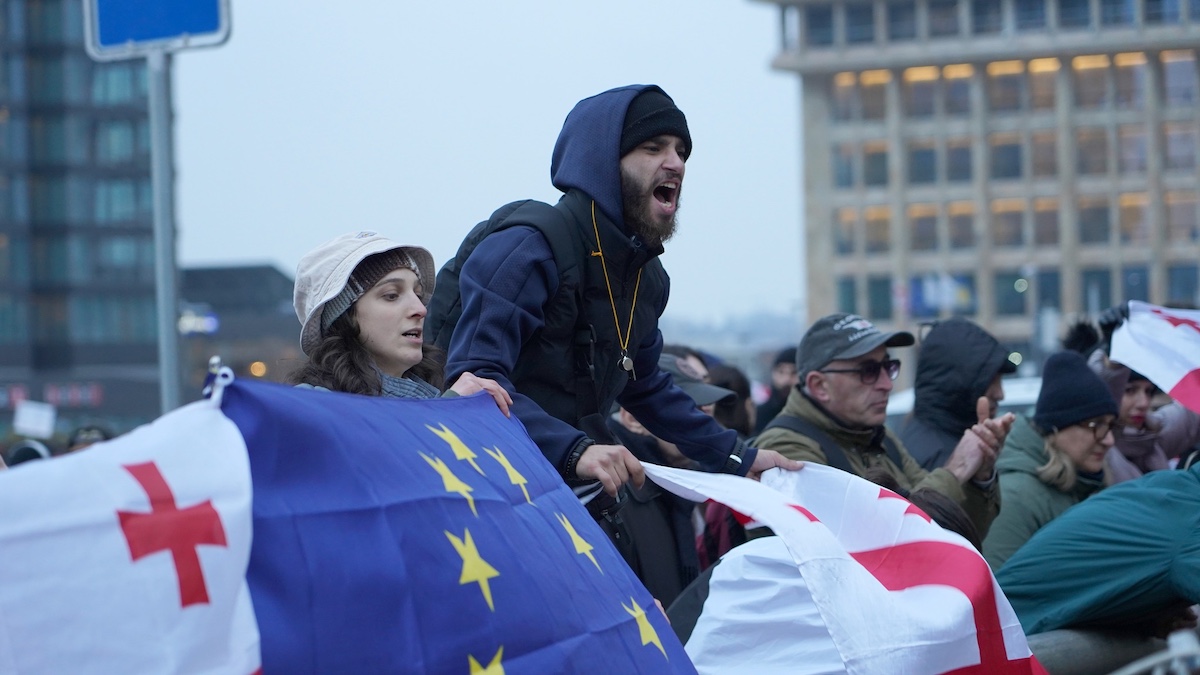On October 4, Georgia will see a rally aiming for a "peaceful change of government." What is known so far?
4 October rally in Tbilisi
Municipal elections in Georgia are set for 4 October 2025. On the same day, a large demonstration is planned in Tbilisi with the declared aim of a “peaceful overthrow of power.” While the ruling Georgian Dream party and two opposition parties taking part in the vote are urging people to go to the polls, the main opposition forces — boycotting the elections — are calling on supporters to join the protest.
Six opposition leaders, almost all of those active in the protest movement since autumn 2024, are currently in prison on administrative and criminal charges.
However, many questions remain among the public — including supporters of the rally:
- What exactly will happen on the day?
- Should Georgian Dream really be overthrown on 4 October?
- Is there a concrete plan? Is it reasonable to place such high expectations on a single protest?
- What if this rally, too, becomes just another in the long series of demonstrations that have been going on for almost a year?
- Are the organisers ready for the bitter disappointment that could follow?
- Could it end up strengthening the regime instead?
And so on.
In this article JAMnews sums up what is known — and what remains unclear — about the 4 October rally.
Who is organising the rally
The 4 October rally does not have a single organiser, but several figures have been especially active — among them opera singer Paata Burchuladze.
Burchuladze entered Georgian politics in 2016, when he founded the movement State for the People and took part in parliamentary elections. His bloc failed to clear the 5% threshold to enter parliament, but he remained in politics.
When pro-European protests broke out in Georgia in 2024, Burchuladze quickly joined in. To this day he appears almost every evening outside parliament on Rustaveli Avenue in central Tbilisi. The interior ministry has already issued him 34 fines for “unjustified road closures,” totalling 170,000 lari ($63,000).
He now leads the movement Rustaveli Avenue, which emerged spontaneously during the pro-European protests. Around him have gathered people from different walks of life, united by their demand for a “Georgia without Ivanishvili.”
Another figure whose focus has recently been fixed entirely on the 4 October rally is Levan Khabeishvili, former chair of the country’s largest opposition party, the United National Movement.
He is now in prison after being arrested on 11 September by Georgia’s State Security Service. He faces two charges: publicly offering a bribe to officials — he allegedly promised $200,000 to special forces officers if they refused to disperse protests — and calling for the overthrow of the government. He has been placed in pre-trial detention and banned from any outside contact.
Khabeishvili said his arrest was directly linked to the upcoming rally.
“They are detaining me because, as it turns out, one man, Khabeishvili, can defeat Ivanishvili,” the opposition politician declared.
Before the ban on contact, he managed to send a letter from prison expressing confidence in the rally’s success:
“With this arrest, Ivanishvili has effectively helped us — he has convinced us that he has already lost,” he wrote.
“On the 4th we begin, on the 4th we finish.” Who is expecting what from the rally
“Everything begins and ends on 4 October,” Paata Burchuladze repeats in every broadcast.
“In the past, it was always the same: people would gather, shout ‘call new parliamentary elections,’ 200,000 would come out onto the streets and then go home. That will not happen on 4 October. How can we allow people to just leave again? On the 4th we begin, on the 4th we finish. On 4 October we will achieve what we want,” he told viewers on the Palitranius programme on 3 September.
Burchuladze expects between 200,000 and 300,000 people to attend the rally. He says it will take place simultaneously in three locations across Tbilisi and will address three issues — though so far he has disclosed only one:
“The first question we will put to participants is whether the Georgian people want to take power into their own hands within the framework of the constitution. I am sure everyone will say ‘yes’. And that is what we will do.
On 4 October we will present a [new] cabinet of ministers to the public and announce the composition of a technical government. As for the second and third questions, I will reveal them later.”
Many opposition figures and would-be participants, however, are sceptical about Burchuladze’s predictions. His claims even triggered a split within the opposition camp. Many argue that there can be no such thing as an “announced revolution” and that raising such hopes among disillusioned people is irresponsible.
Tamar Chergoleishvili, a leader of the Federalists party, wrote on social media that she would not take on such political responsibility:
“I can say with full responsibility that the regime is very weak, time is working against it, and it is collapsing. I take political responsibility when I say that the countdown for Ivanishvili has begun, and his fall is not a question of if but when…
The 4 October rally is a good event. But it is wrong to instil such expectations in citizens. It does nothing to rebuild trust between voters and politicians. We fight until victory, not until some arbitrary October date.”
The main opposition coalition, Coalition for Change, which boycotted the government as illegitimate and refused to take part in the municipal elections, has four leaders — all of whom are currently in prison. The last of them, Elene Khoshtaria, was arrested on 15 September on criminal charges after writing “Russian” on a campaign banner for the ruling party’s candidate for Tbilisi mayor.
The rest of the coalition’s members and supporters plan to attend the 4 October rally, but they are not raising expectations too high.
“We must move forward with a united protest. We all have to be out on the streets until we end this Russian regime,” Khoshtaria declared shortly before her arrest.
The rally is also being watched with concern by those who have been taking part in near-permanent protests outside parliament in Tbilisi — now stretching past 300 days.
“The overthrow of the regime on 4 October and Ivanishvili’s early flight on the 3rd may be exactly what many crave. But announcing it gives the regime time to prepare. And if the rally fails, it will plunge us into despair and nihilism. It will take even longer to pull society out of this state,” wrote former civil servant David Chkheidze, an active protester who was fired from his job over his activism.
Two other opposition parties — Lelo and For Georgia, the party of former prime minister Giorgi Gakharia — also boycott Georgian Dream, but have decided to take part in the municipal elections with joint candidates. Their position on the 4 October rally, however, remains unclear.
The opposition party Lelo sees no problem with its supporters casting their votes in the morning and joining the rally in the evening. But the party avoids giving concrete answers — for instance, on what role it might play at the rally or whether its leaders will attend.
“We are not the organisers of this rally, we are not part of that team and we don’t even know who the organisers are. We are a civic movement, and of course anyone who wishes can go. That does not exclude going to the polling stations in the morning,” said Lelo member Lana Galdava on Georgia’s Public Broadcaster. She herself is standing in the municipal elections.
Unlike Lelo, the position of former prime minister Giorgi Gakharia’s party For Georgia is more clear-cut.
“We will not take part in the 4 October rally,” party member Levan Gogichaishvili said on 17 September.
According to him, “banging your head against the wall and making threats is artificial radicalisation. Elections are the only right path.”
The government’s stance
The ruling Georgian Dream party appears keen to project an air of indifference about the upcoming rally. It has repeated its anti-Western talking points, insisting the opposition is “following orders from abroad.” It also claims the opposition lacks the influence and resources to bring about a change of power, and predicts Georgian Dream will again score a convincing win in the municipal elections.
“They say they want to change the government by force. Let me stress once again: all of this is being coordinated from outside. This is yet another escalation,” said Shalva Papuashvili, the parliament speaker from Georgian Dream.
Prime minister Irakli Kobakhidze warned: “If they hope their provocations and criminal acts will be tolerated, no one will allow that.”
Tbilisi’s incumbent mayor Kakha Kaladze also issued a threat: “If they dare to break the law, there will be an appropriate response and they will be punished in the strictest way — naturally, within the law.”
After Levan Khabeishvili’s arrest, many wrote on social media that Georgian Dream seemed to believe in the 4 October rally’s success more than the protesters themselves. By jailing him, they argued, the authorities had effectively done the organisers’ job by raising the rally’s profile.
“For me this means only one thing: Bidzina Ivanishvili really does fear a revolution. He takes the talk of a ‘peaceful overthrow’ on 4 October far more seriously than most of his opponents — including me. His actions are making 4 October a more important date than it otherwise would have been,” said political analyst Ghia Nodia.
News in Georgia






















